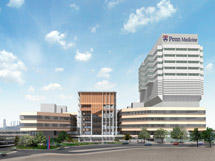
Abramson Cancer Center
Comprehensive Cancer Center
Robert H. Vonderheide, M.D., D.Phil., Director
Philadelphia, Pennsylvania
Main: 215-615-5858
The Abramson Cancer Center (ACC) of the University of Pennsylvania is a global leader in basic, translational, clinical, and population science research for the advancement of cancer care. The ACC was founded in 1973 and was one of the first NCI-Designated Comprehensive Cancer Centers, receiving that designation in 1974. The ACC is deeply committed to its mission to improve the lives of adults and children with cancer in the greater Philadelphia area, across the nation, and around the world. The ACC is a matrix cancer center embedded within the University of Pennsylvania and the University of Pennsylvania Health System, which encompasses the Hospital of the University of Pennsylvania, Pennsylvania Hospital, Penn Presbyterian Medical Center, and Children’s Hospital of Philadelphia. The mission of the ACC is to embody a “science-driven, patient-focused” comprehensive cancer center. Members of the ACC have leveraged multidisciplinary approaches to address some of the toughest problems in cancer research, developing novel therapeutic agents and other breakthrough discoveries.
Research at the Abramson Cancer Center
The ACC has more than 300 members whose research programs range from basic cancer biology to treatment and prevention clinical trials. Nine research programs are supported by nine shared resources to ensure the latest technologies and methodologies are available to ACC members in all disciplines.
The ACC is an international leader in cancer immunotherapy, pioneering the breakthrough of chimeric antigen receptor (CAR) T-cell therapy which culminated in the first cell and gene therapy for adults and children with cancer approved by the US Food and Drug Administration (FDA). ACC researchers also led the first US-based trial of CRISPR gene editing for people with cancer. Research at the ACC spans many different disciplines of cancer research. Examples include defining novel principles of T-cell response and cancer inflammation, forging innovations in radiation therapy (especially proton therapy in the Roberts Proton Therapy Center), advancing molecular and surgical imaging, and defining the impact of inherited genes that cause cancer, especially mutations in BRCA1/2. Cumulatively, members of the ACC have led or co-led studies that resulted in multiple FDA approvals of cancer therapies ranging from immunotherapy to targeted therapy to robotic surgery. Members of the ACC are national leaders in establishing new intervention strategies to improve public health, advocating for policy change, and addressing cancer risk factors, especially nicotine addiction and obesity.
Select Scientific Initiatives at the Abramson Cancer Center
A signature principal of the ACC is collaboration—bringing together experts from multiple disciplines to tackle the greatest challenges in the field. Teams of scientists and clinicians work in multiple translational centers of excellence (TCE), leveraging more than $23 million of institutional investment to drive discovery and translation to the clinic. Current TCEs are focused on tumor cell dormancy in breast cancer, precision profiling of blood cancers, clinical trials in pancreatic cancer, immunotherapy in lung cancer, tissue profiling in ovarian cancer, and CAR T-cell therapy for the brain cancer glioblastoma. In each case, basic discovery has led to active clinical trials that are recruiting nationwide.
Another scientific initiative that exemplifies the ACC mission is the Basser Center for BRCA, the world’s first comprehensive center for the research, treatment, and prevention of BRCA-related cancers. This center has driven significant advancements in understanding inherited cancer genetics—a growing consideration in cancer. The Basser Center has uncovered new mechanisms of DNA repair, refined knowledge of cancer risk factors, improved the ability to screen patients and to predict how they will respond to therapies, and developed ways to target specific tumor types. The approach laid the groundwork for the development of PARP inhibitors, an FDA-approved treatment that can benefit many patients with mutant BRCA-related cancers.
The ACC repudiates racism and discrimination in all its forms, and as such, has a particular focus on addressing disparities in cancer care. The ACC’s Community Outreach and Engagement Program acts to ensure that the cancer-relevant needs and disparities in the region are addressed and solved, and importantly, to engage community members in advancing and shaping the center’s research, education, and outreach to close racial and economic gaps in cancer care. These efforts have reached tens of thousands of residents and health care providers. A major accomplishment has been increasing access of Black patients in the community to cancer prevention, screening, and care—including enrollment to ACC clinical trials. Although there is more work to do, the percentage of Black patients being seen at the ACC and the percentage of Black patients enrolling in clinical trials now matches or exceeds the percentage of Black residents in the community who have cancer.
* This profile was provided by the Abramson Cancer Center.